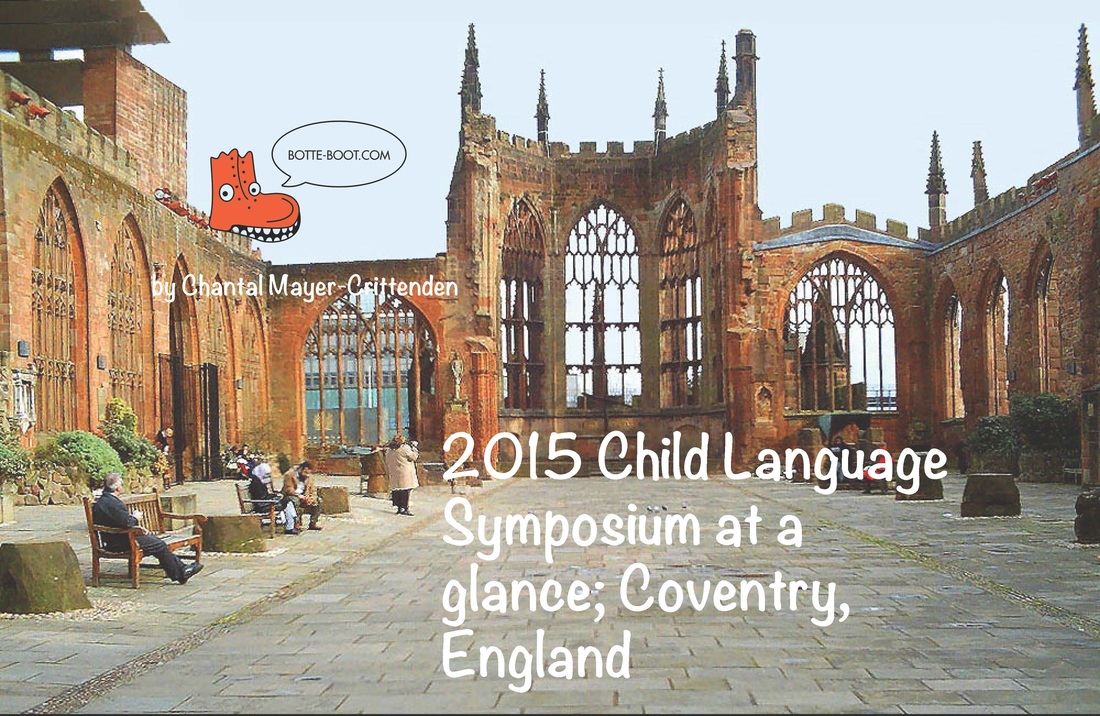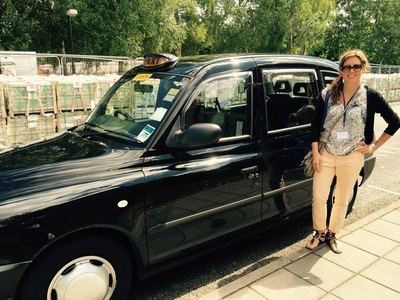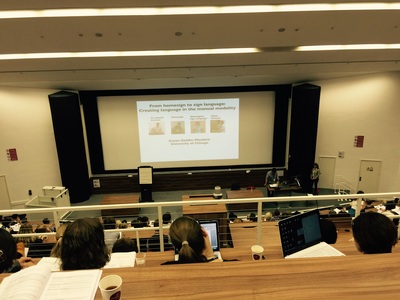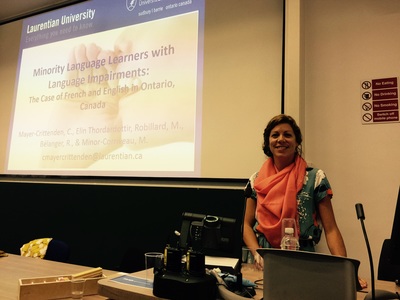|
I like to participate in international conferences because it gives me the opportunity to see what other researchers who have an interest in child language are doing and how they are going about it. The Child Language Symposium in Coventry was just that. Coventry, which was once England’s capital, suffered severe bomb damage during World War II. We very much enjoyed walking through the historical sites of the city when we weren’t at the symposium so I’ve included some pictures in this post. Back at the University of Warwick, I found myself captivated by many different presentations. Many of which opened my eyes to the importance of cognition and resilience on language development. As much as I enjoyed presenting and talking about what goes on in my part of the world, I especially enjoyed the conversations I had with other professionals from Israel, England, Russia, Poland and elsewhere who are as passionate about this field as I am. In the paragraphs that follow, I will try to give an overview of what took place over three days with over 300 delegates!
We often don’t even think about how children learn language. It’s something that all kids do, and for the most part, they do it without any formal teaching. Our brains are extremely complex and it goes without saying that language is only possible because of the way we perceive the world, the way we think, the way we adapt and because of our innate desire to communicate with those around us. There were some very interesting talks on deaf children who grow up developing their own signs and gestures to communicate with their hearing parents and how they can convey meaning without words because of their strong desire to communicate. Fascinating stuff! Some researchers are looking at how using gestures can help activate the parts of the brain that are responsible for language, while others are looking at how theory of mind is a crucial ingredient in the recipe for language learning and language production. In a nutshell, theory of mind (ToM) is one’s ability to think about what other people might be thinking and how this can influence their actions. ToM is therefore very important for language development and communication. What I found most striking was how children are so resilient when it comes to language development. Even those who have many odds against them can develop adequate language abilities when given a chance. This is important to remember. It always makes me sad when I work with children who have difficulties with language, be it oral or written. How can it be that for some, language comes so naturally while others struggle so much? We can make a big difference. We can provide these children with the tools that they need to succeed. Because children can and want to succeed. There were many different speakers at this conference and all of them were trying to figure out how we learn language, how we use it and most importantly, how we can help those who struggle with it. Most of them showed that education is key. That is, educating parents, caregivers and teachers about the importance of language stimulation, book reading and peer interaction. It was reiterated several times during the conference that bilingual children, no matter what languages they speak, will have fewer vocabulary words in each of their languages than monolingual kids. This is not news, but it was a nice reminder to not be alarmed when bilingual kids don’t have the same vocabulary knowledge in each of their languages then native speakers. However, when you add up all the different words they know, they usually come out ahead of the game. Some studies that have been conducted in Europe included children who speak two, three and even four languages. Some have even shown a possible bilingual advantage such that learning more than one language helps them overcome some of the cognitive shortfalls that are associated with language impairments. As speech and language pathologists, most of us were trained to look at kids’ language skills only. However, many studies have shown that children need to have good memory, good attention, and good processing skills (executive functions, as they are called), among others, to learn language. We need to change how we think and look at language as a process of interactions between cognition and language. In fact, it doesn’t quite make sense to separate the two since they are intertwined in our brains. By looking at both of these elements we can better understand children, how they learn and how to help develop their language skills. I was pleased to see that there were a few poster presentations on ADHD and language. Although these were far and few between, they all showed that most kids with ADHD have pretty significant language difficulties, especially when it comes to social language skills. We need to work with kids with ADHD, but these kids often fall between the cracks, especially if they don’t have obvious language weaknesses. Social skills are extremely important to function and to be accepted in this very busy world. We, as parents, educators and speech language pathologists can help children develop social thinking and coping strategies. More and more assessment tools include a social skills component. Lets not ignore it. Being socially inept can be debilitating in this sometimes “dog eat dog” world. It was also shown that, as I mentioned in a previous post, many children with ADHD also have language impairments which puts them that much more at risk for academic failure, depression and segregation. Some studies also showed how kids with language impairments often have fewer friends and end up getting jobs that pay less then typically developing kids. I think that we can help break the cycle… These are only a few of the topics that were covered but it gives an idea of what the trends are right now in the study of child language. At the request of some readers, I will be posting our presentation and some of the posters that my colleagues, graduate students and I presented on my website under the “useful resources” tab. I am thinking of inviting a guest author for my next post. I will provide more details as soon as I have confirmation! Chantal Mayer-Crittenden, 2015 |
|








 RSS Feed
RSS Feed